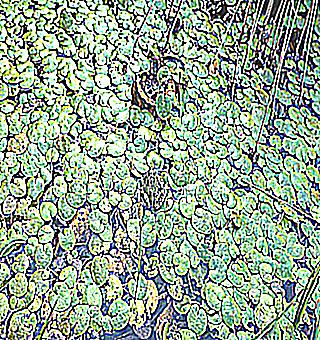Home >
Erectile Dysfunction >
Marsh duckweed for impotence
Marsh duckweed for impotence

Herbalists refer to marsh duckweed, or duck grass, to flowering plants from the aroid family. The plant has small green leaves that can be seen on the surface of water bodies. The diameter of duckweed leaves, as a rule, is up to 1.5 cm.
The plant has no stem. Flowers on duckweed rarely grow; when they arise, they form small inflorescences. Duckweed is quite undemanding to growing conditions and quickly multiplies in various shallow water bodies, where there is no strong current. The main condition for the growth of medicinal herbs is the availability of a large amount of fresh water. Duckweed continues to grow even in the winter season, when the surface of the reservoir is covered with an ice crust. In spring, when ice melts, the overgrown areas float to the surface. Since duckweed is a favorite food for waterfowl, it is often referred to as duck grass.
Procurement and storage of medicinal raw materials
A fundamentally important aspect of harvesting a medicinal plant is the correct choice of the place of collection. Duckweed is a widespread herb, but its root is distinguished by its ability to absorb components from the habitat. This means that a plant in a polluted body of water can have a negative impact on human health. To collect the duckweed root, it is necessary to choose clean places, remote from the road route and production complexes. The presence of waterfowl can serve as a guideline for determining the quality of water. The collection of the plant is done by means of a landing net. The resulting raw material is thoroughly washed under running water and laid out for drying in the fresh air under a canopy or in a ventilated room. For fast and uniform evaporation of moisture, it is necessary to spread the roots in a thin layer and move them periodically. The dried parts of the duckweed are finely chopped and placed in glass vessels. The medicinal product should be stored in a dark place with a minimum level of humidity. Subject to the recommended storage conditions, the components of the plant retain healing properties for 12 months.
Chemical composition of aquatic plant
Marsh duckweed contains a large amount of vegetable protein and healthy fats. This composition makes it an excellent food product, the calorie content of which is similar to the calorie content of cereals and potatoes. Among the components of the aquatic plant is protein, which is necessary for increasing muscle mass and improving the functioning of the nervous system. Also among the ingredients of duckweed you can find:
- arginine and aspartic acid
- rare amino acids
- vitamins PP, A and E
- trace elements (titanium and cobalt, zirconium and vanadium, magnesium and copper, iron and bromine, radium and gold)
- flavonoids
Features of the use of duckweed for medical purposes
Most often, the plant acts as an antipyretic and choleretic, analgesic and antihelminthic agent.
Benefits for the hormonal system
A high content of iodine is found in the composition of marsh duckweed. This component has a healing effect on the endocrine system, prevents the development of dysfunction of the thyroid gland and testicles. That is why men of different ages use duckweed extract to increase the level of testosterone in the blood and maintain a normal level of potency.
Benefits for nervous diseases
The general strengthening and immunomodulatory effect of duckweed is manifested in the form of normalization of the central nervous system. Regular consumption of dried roots helps to increase stress resistance and avoid the onset of psychogenic impotence.
Skin benefits
Marsh duckweed is traditionally used to treat dermatological diseases. An infusion based on the root of a medicinal plant helps to reduce ulcerative skin lesions, erysipelas, cope with boils and hives.
Benefits for joints
The high efficiency of the aquatic plant in the treatment of diseases of the musculoskeletal system has been proven. In particular, regular compresses with duckweed infusion help to reduce the intensity of rheumatic pains. Duckweed preparations are prescribed for persons suffering from exacerbation of gout, arthritis and arthrosis. The components of the medicinal plant eliminate the feeling of aches in the joints, produce anesthetic effect and help to reduce the swelling of the lower extremities.
Revitalizing agent
The fortified product is highly nutritious. Due to the presence of a sufficient amount of fats and proteins, the purified duckweed root is used to increase body weight in case of dystrophy, to strengthen the body of premature newborns.



























